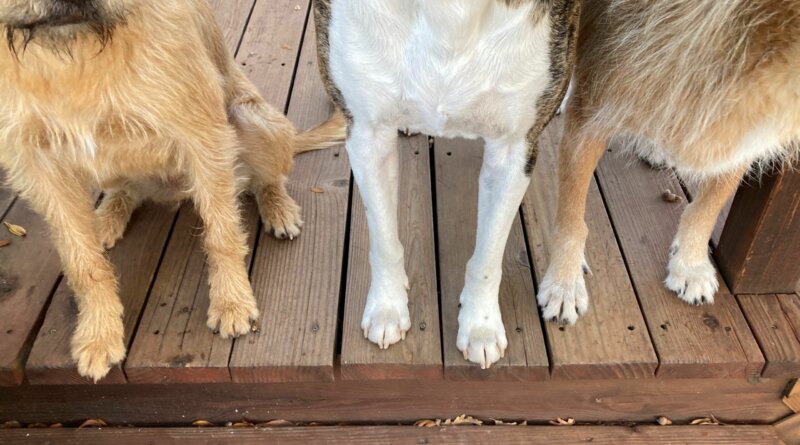Dog Nail Trimming Thoughts – Whole Dog Journal
No one likes trimming their dogs’ nails. But it has to be done. Owning multiple dogs makes it worse! But when I notice everyone click, click, clicking across my kitchen floor, or take a picture of them where their nails look long, I often stop what I’m doing on the spot and grab the clippers.
Old dogs’ nails grow the fastest – or do they? No, it just seems that way with older dogs. They are likely growing at the same rate as ever, but because senior dogs exercise less, and move more carefully, they wear their nails down less, making it necessary to trim those crusty, thick, old nails more often.
The nails of older dogs do seem to grow thicker and stronger with age, making them (especially in big dogs) more difficult to cut, or take longer to Dremel. Ugh! I just realized, however, that I don’t remember when I bought the clippers I’m using; they have probably gotten dull with age. As soon as I’m done clipping everyone’s nails today, I’m ordering some new clippers.
I own a variety of nail-trimming tools, picked up for various uses (and articles) at various times. I use a Dremel grinding tool to smooth and shape the nails after I cut cut them with a plier-style trimmer. I loathe the guillotine-style trimmers, where you have to poke the nail to be cut through a little window before squeezing the handles to slice through the nail. They cut really well, but getting the nail through that little hole and keeping it still long enough, in just the right spot for the slice – well, in my experience, dogs often jerk or move just enough to cause an over-aggressive slice into the quick. Ouch! And while I own a nice nail grinder, I don’t like to use the grinder alone to shorten my dog’s nails. You have to be super careful to grind for only a second or two, and then back away the grinder away for a second or two, in a repetitive grind-release, grind-release motion, or the nail you are grinding gets HOT and causes a burning sensation to the dog.

As I trim the nails of 15-year-old Otto, I notice that his front nails are longer than those of my other two dogs – but the nails on his back feet don’t need any trimming at all. This is likely because his nails get a tiny scraping whenever he fails to completely lift his back feet as he walks. Dogs with serious injuries or partial paralysis who drag one or both of their hind legs visibly often need to wear something on their hind feet to protect the nails (and even the toes themselves) from getting worn down to the point of pain. The wear on Otto’s back nails confirms what I see as the highly arthritic senior walk around my property; he’s not lifting his back feet all the way off the ground all the time. Fortunately, the growth of the back nails is keeping pace with the wear; I can skip clipping those nails but don’t need to order protective booties at this time.
Most of 7-year-old Woody’s nails are white. This makes clipping them a pleasure, because I can readily see the “quick” through the nail, and can clip them fairly short without risk of hurting him with an errant snip. However, white nails tend to be softer and more breakable; they seem to at a higher risk of breaking or tearing, something he’s done more than once – and which always seems to happen the minute I think to myself, “Ooh, Woody’s nails are getting long. I should trim them.” (See this article, which features a gruesome picture of one of his broken nails.) That’s probably why he’s the best sport I have about getting his pedicures; he’s been “quicked” the least.
At almost 1-year-old, Boone’s nails are still pointy and puppy-like. As black as they are, and growing thicker with age, it’s still easy to clip through them – when he holds still. I haven’t quicked him yet; he just hates having his feet handled. We’ve been working on that since he was a chunky little puppy with a propensity for collecting clover burrs in the bottoms of his fuzzy feet. He’s still learning to cooperate for nail trims, and requires a treat for every single nail I clip. If I try to trim two in a row, he yanks his paw away and gives me an aggrieved look. The deal we’ve agreed upon over the past few months is one nail, one treat, and he’s not re-negotiating the terms any time soon. Fair enough.
At least all my dogs are big and do wear their nails a reasonable amount; I have to trim them only about every three to four weeks. Woody’s best little buddy Samson, who doesn’t weigh quite five pounds, needs his nails trimmed every other week. I think it’s because he’s so light, he doesn’t tread on his nails with enough pressure to wear them even one iota! As a result, his nails always are a bit too long.
The only time they get trimmed back to a painful but proper length is when he’s gone under anesthesia for a dental and the vet staff took the opportunity to get close to, or even into the quick. But it’s really difficult to maintain them at that length; I think his owner would have to be using a Dremel grinder on them once or twice a week – and like many little dogs, he is not the least bit cooperative about this. Why it’s so difficult to convince tiny dogs to hold still for nail trims, I do not know, but my friend has found that it works best to take Samson to a groomer. He’s much more compliant for strangers.
I was talking with a client at my friend’s training business recently, who said she has to administer Trazodone to her 10-year-old miniature Australian Shepherd before each vet, grooming, or nail appointment. She adopted the dog as a rescue from a breeding facility, where the little dog received zero socialization and exposure to the world, and is highly fearful about handling and novel situations. That’s quite a committed owner, taking on that extra expense to keep the little dog from being traumatized by being forcibly restrained for routine care procedures.
Most owners can learn how to trim their own dogs nails, and with patience, most dogs can be taught to cooperate for nail trims (here’s how), but I don’t judge anyone who takes their dogs to a groomer or vet for nail trims – however it gets done most easily and most often is the best way, for the health of your dog’s feet and for his comfort!




